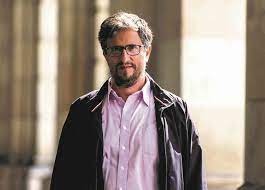Eighteen established writers, one from each city/region, will be commissioned to write a chapter in a response to their Arts & Society theme within the context of their city.
Just as Ulysses is innovative in its form and language, so the writers will be chosen with a view to reflecting a breadth of genres, styles and innovations. Each writer will ideally attend their own city’s event. All the (new) chapters from the 18 cities/regions will be brought together in a book publication: ULYSSES European Odyssey.
Alberto Lema will write Lugo’s chapter.
Writer’s Statement
Lucus, Lupus and Octopus
Nobody knows how many tapas they can give you for free when you have a wine or a beer in Lugo. They differentiate between “pincho” and “tapa”. The first is usually a little hot dish to eat with a spoon, beans, lentils, broth or even, sometimes, octopus. The tapa is the piece of cheese, tortilla, ham (or literally anything) served on a small piece of bread. The generosity and hospitality of the Luguese innkeepers is legendary and exceeds the most elementary rules of economic viability: it seems as if they offer you much more food than the value of your drink. In any case they have been doing this since time began and they are still there today, open and working, so in the end there must be, oddly enough, a positive balance between what they give and what they take.
The Festival of San Froilán, in the Autumn, becomes the apotheosis of the love story between the city and its gastronomy, in this case starring the octopus, which seems like the real saint who is worshiped during the Festival, instead of the poor Saint himself. Froilán, born in Lugo in the 9th century, ended up becoming Archbishop of León and was beatified for his exemplary life in defence of the poor and defenceless, was also a maker of miracles and a prodigy: it is said that he was capable of taming wolves, which is why he is always represented with a friendly wolf by his side. The relationship between Lugo and the octopus, which is not a coastal city, refers to the gift of a dry octopus which the Lugo church collected from its tributary towns in the Galician coast.
There are certain words which seem destined to pair up some day in the future, such as octopus and wolf, and what better place than Lugo for their meeting? Their original names in Latin, Lucus, lupus and octopus, seems to validate our theory. Perhaps History, as Stephen feared, really is a collective nightmare caused by a huge meal from which we are all trying to wake up in a place like Lugo, a city surrounded by stone, fog and despair.
Writer’s Biography
Alberto Lema has a degree in English Philology from the University of Santiago de Compostela. He is a novelist, poet, literary critic and columnist in the press. He writes in Galician and is the author of the novels Unha puta percorre Europa (A Whore Travels Europe), Sidecar, Da máquina (About the Machine, 2012) and Pazo de inverno. As a poet, he wrote Plan de fuga (Escape Plan, 2008) and Crónica do chan (Chronicle of the floor, 2014).
He won the Pazo de Inverno (Winter Palace) García Barros Novel Prize in 2021.
The literary work of Alberto Lema has so far been an exploration of the relationship between the personal and the political, the present and its historical background and the concept of literature as a social and ideological ‘product’. Modern day Galicia is the (almost) exclusive topic of his novels and poems, all of them written in Galician – a landscape crowded with cultural, social and genre conflicts, in which the possibility of a revolutionary solution to its own dilemmas is sometimes addressed. Lema has also been published as a literary critic in specialised reviews and has written on contemporary topics in the press.
He has written for various media outlets such as El País, Tempos Novos and Praza and he collaborates weekly with the newspaper La Opinion of A Coruña.
Since 2015 he has been a Councillor in the City Council of A Coruña – until now in opposition to the government. He is the Deputy Mayor of Coruña Provincial Council, and is currently a librarian on leave from the Royal Galician Academy of Language.



